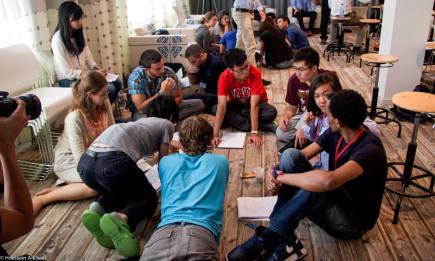Doing global ‘AI’ in Beijing

The 8th edition of the STeLA International Leadership forum was held at Stanford University. In August 2015, the China branch will host the forum in Beijing. The theme of this edition will be related to “Artificial Intelligence”.
STeLA (Science and Technology Leadership Association) is an international network aimed at developing outstanding students’ leadership skills by organising a demanding annual forum. This forum focuses on personal development through intensive feedback. Excellent students from universities worldwide are brought together to form a lasting network, ready to tackle global issues.
Health and bioethics
During the forum leadership theory is taught in the morning, in the afternoon participants are able to apply this in a thematic session. By working together under time-pressure, participants explore their own boundaries and face struggles and conflicts within their team. The teams really become close through the intensive reflection sessions, guided by their facilitators.
STeLA provides students with the unique experience in leadership and personal development that prepares the leaders of the future for the challenges they will face in their careers, something that is rarely touched upon in higher education.
This year’s forum was focussed on the global issue of ‘Health and bioethics’. Where in the world would be a better place to discuss this issue than at Stanford University, situated in the middle of Silicon Valley, home to many of the world’s largest corporations in bioengineering? Subtopics that were discussed are: Genetically Modified Organisms, Health Information, Personal Genomics and Frugal Innovation.
Frugal innovation?
The keynote speaker was Manu Prakash. As assistant professor in bioengineering at Stanford University, he puts a lot of effort in decreasing the cost of scientific exploration. Together with his laboratory he mainly focuses on frugal sciences and the democratisation of scientific tools, to make them available to third world countries. These scientific inventions are supported by sociological research after awareness issues required to eradicate infectious diseases.
Just implementing measures resulting from scientific research isn’t enough. In order to make sense of the rationale behind such measures, people need to understand why they are taken. The foldable, paper microscope that he invented could play an important role in this process as it enables people to actually see the infectious organisms living in e.g. drinking water. Project Foldscope was initiated to distribute 50.000 of these microscopes around the globe to educate people about infectious organisms. (www.foldscope.com)
Final challenge
During the first part of the forum the participants really become a team through the practice with the leadership theory accompanied by intensive peer reviews and counselling by the facilitators. During the last three days of the forum, the teams work on a bigger challenge during the so-called group project. This edition, their goal was to design an educational game to raise awareness for an issue related to health or bioethics.
Jim Cummings and James Scarborough, both specialists in the field of serious gaming and gaming psychology, provided support and advise. The hard work, short nights of sleep and heated discussion within the teams resulted in seven high quality games and, probably most important, a very intensive and valuable learning experience for every member in the teams. See more of their work here.
Novelties and trends
This year’s participant group comprised of the same ratio of participants per branch, however we were happy to invite also students from the United Arab Emirates and even from Nigeria. These surprising applications proved that STeLA is spread more and more around the globe, which is very positive as these people brought even more different insights to the forum.
Another aspect of the participant group of this year was the fact that there were a lot of participants with a background in medicine and biomedical sciences that were able to shed their light upon the issues at hand. Although this group was even more diverse than other years, they also seemed to bond more intensively. A lot of the participants took the initiative to have drinks together after the programme had ended. This tendency is likely to result in more intensive contact after the forum as well. Within the Europe branch at least, there seems to be al lot of enthusiasm for alumni reunion events. Obviously that is exactly what STeLA aims for!
Next year’s forum
In August 2015, the China branch will host the forum in Beijing. The theme of this edition will be related to “Artificial Intelligence”. The China team presented the forum venue and theme in a miraculous video that was made by one of their staff members. All branches are in the process of changing to their new boards, this process will be finished these weeks of early November, after which the real preparations for the new edition will start.
Meest Gelezen
Vrouwen houden universiteit draaiende, maar krijgen daarvoor geen waardering
Wederom intimidatie van journalisten door universiteit, nu in Delft
‘Burgerschapsonderwijs moet ook verplicht worden in hbo en wo’
Raad van State: laat taaltoets nog niet gelden voor hbo-opleidingen
Hbo-docent wil wel rolmodel zijn, maar niet eigen moreel kompas opdringen

